2020年2月版浙江省新高考研究卷英语(三)
2020年全国新高考英语浙江卷含答案-全
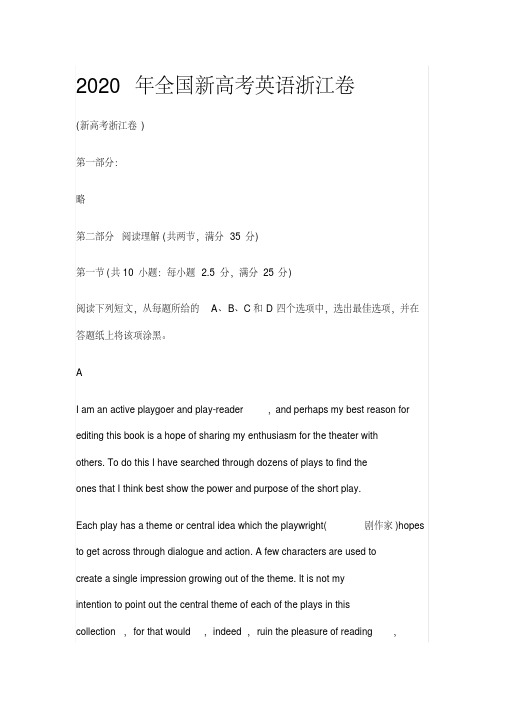
2020年全国新高考英语浙江卷(新高考浙江卷)第一部分:略第二部分阅读理解(共两节,满分35分)第一节(共10小题:每小题 2.5分,满分25分)阅读下列短文,从每题所给的A、B、C和D四个选项中,选出最佳选项,并在答题纸上将该项涂黑。
AI am an active playgoer and play-reader,and perhaps my best reason for editing this book is a hope of sharing my enthusiasm for the theater withothers. To do this I have searched through dozens of plays to find theones that I think best show the power and purpose of the short play.Each play has a theme or central idea which the playwright(剧作家)hopes to get across through dialogue and action. A few characters are used tocreate a single impression growing out of the theme. It is not myintention to point out the central theme of each of the plays in thiscollection,for that would,indeed,ruin the pleasure of reading,discussing,and thinking about the plays and the effectiveness of the playwright. However,a variety of types is represented here. Theseinclude comedy,satire,poignant drama,historical and regional drama.To show the versatility(多面性)of the short play,I have included a guidance play,a radio play and a television play.Among the writers of the plays in this collection,Paul Green,Susan Glaspell,Maxwell Anderson,Thornton Wilder,William Saroyan,and Tennessee Williams have all received Pulitzer Prizes for theircontributions to the theater. More information about the playwrights willbe found at the end of this book.To get the most out of reading these plays,try to picture the play on stage,with you,the reader,in the audience. The houselights dim(变暗). The curtains are about to open,and in a few minutes the action and dialogue will tell you the story.21. What do we know about the author from the first paragraph?A. He has written dozens of plays.B. He has a deep love for the theater.C. He is a professional stage actor.D. He likes reading short plays to others.22. What does the author avoid doing in his work?A. Stating the plays' central ideas.B. Selecting works by famous playwrights.C. Including various types of plays.D. Offering information on the playwrights.23. What does the author suggest readers do while reading the plays?A. Control their feelings.B. Apply their acting skills.C. Use their imagination.D. Keep their audience in mind.24. What is this text?A. A short story.B. An introduction to a book.C. A play review.D. An advertisement for a theater.BThe traffic signals along Factoria Boulevard in Bellevue,Washington,generally don't flash the same length of green twice in a row,especially at rush hour. At9:30am,the full red/yellow/green signal cycle might be140 seconds. By 9:33am,a burst of additional traffic might push it to 145 seconds. Less traffic at 9:37am could push it down to 135. Just like thetraffic itself,the timing of the signals changes.That is by design. Bellevue,a fast-growing city,just east of Seattle,uses a system that is gaining popularity around the US:intersection(十字路口)signals that can adjust in real time to traffic conditions. These lights,known as adaptive signals,have led to significant declines in both thetrouble and cost of travels between work and home.“Adaptive signals can make sure that the traffic demand that is there isbeing addressed,”says Alex Stevanovic,a researcher at Florida Atlantic University.For all of Bellevue's success,adaptive signals are not a cure-all forjammed roadways. Kevin Balke,a research engineer at the Texas A&M University Transportation Institute,says that while smart lights can be particularly beneficial for some cities,others are so jammed that only a sharp reduction in the number of cars on the road will make ameaningful difference. “It's not going to fix everything, but adaptive signals have some benefits for smaller cities,”he says.In Bellevue, the switch to adaptive signals has been a lesson in the valueof welcoming new approaches. In the past, there was often an automatic reaction to increased traffic: just widen the roads, says Mark Poch, the Bellevue Transportation Department's traffic engineering manager. Nowhe hopes that other cities will consider making their streets run smarter instead of just making them bigger.25. What does the underlined word “that”in paragraph 2 refer to?A. Increased length of green lights.B. Shortened traffic signal cycle.C. Flexible timing of traffic signals.D. Smooth traffic flow on the road.26. What does Kevin Balke say about adaptive signals?A. ' They work better on broad roads.B. They should be used in other cities.C. They have greatly reduced traffic on the road.D. They are less helpful in cities seriously jammed.27. What can we learn from Bellevue's success?A. It is rewarding to try new things.B. The old methods still work today.C. I pays to put theory into practice.D. The simplest way is the best way.CChallenging work that requires lots of analytical thinking,planning and other managerial skills might help your brain stay sharp as you age,a study published Wednesday in the journal Neurology suggests.Researchers from the University of Leipzig in Germany gathered morethan 1,000 retired workers who were over age 75 and assessed thevolunteers' memory and thinking skills through a battery of tests. Then,for eight years,the scientists asked the same group to come back to thelab every 18 months to take the same sorts of tests.Those who had held mentally stimulating(刺激),demanding jobs before retirement tended to do the best on the tests. And they tended to losecognitive(认知)function at a much slower rate than those with the leastmentally challenging jobs. The results held true even after the scientists accounted for the participants' overall health status.“This works just like physical exercise,”says Francisca Then,who led the study. “After a long run,you may feel like you're in pain,you may feel tired. But it makes you fit. After a long day at work-sure,you will feel tired,but it can help your brain stay healthy. ”It's not just corporate jobs,or even paid work that can help keep yourbrain fit,Then points out. A waiter's job,for example,that requires multitasking,teamwork and decision-making could be just asstimulating as any high-level office work. And “running a family household requires high-level planning and coordinating(协调),”she says. “You have to organize the activities of the children and take care ofthe bills and groceries.Of course,our brains can decline as we grow older for lots ofreasons-including other environmental influences or genetic factors.Still,continuing to challenge yourself mentally and keeping your mindbusy can only help.28. Why did the scientists ask the volunteers to take the tests?A. To assess their health status.B. To evaluate their work habits.C. To analyze their personality.D. To measure their mental ability.29. How does Francisca Then explain her findings in paragraph 4?A. By using an expert's words.B. By making a comparison.C. By referring to another study.D. By introducing a concept.30. Which of the following is the best title for the text?A. Retired Workers Can Pick Up New SkillsB. Old People Should Take Challenging JobsC. Your Tough Job Might Help Keep You SharpD. Cognitive Function May Decline As You Age第二节(共5小题;每小题2分,满分10分)根据短文内容,从短文后的选项中选出能填入空白处的最佳选项。
详解版:2020年2月浙江省新高考研究卷英语(5)

名校联盟★《新高考研究卷》2020 年 2 月《浙江省新高考研究卷》英语(五)第Ⅰ卷第一部分:听力(共两节,满分30 分)做题时,先将答案标在试卷上。
录音内容结束后,你将有两分钟的时间将试卷上的答案转涂到答题卡上。
第一节:(共 5 小题;每小题 1.5 分,满分7.5 分)听下面5 段对话。
每段对话后有一个小题,从题中所给的A、B、C 三个选项中选出最佳选项,并标在试卷的相应位置。
听完每段对话后,你都有10 秒钟的时间来回答有关小题和阅读下一小题。
每段对话仅读一遍。
1.When does the conversation take place?A. On Monday.B. On Tuesday.C. On Wednesday.2.What is the woman going to do?A. Buy a coffee.B. Check her timetable.C. Attend a meeting.3.When will the train arrive?A. At 9:30.B. At 9:45.C. At 10:00.4.Why is the woman eating so much?A. She is starving.B. She forgot to eat.C. The food looks so inviting.5.What does the man mean?A.The punishment is against the students’ right.B.The students should serve the professor well.C.It is right to punish the students.第二节:(共15 小题;每小题1.5 分,满分22.5 分)听下面5 段对话或独白。
每段对话或独白后有几个小题,从题中所给的A、B、C 三个选项中选出最佳选项,并标在试卷的相应位置。
详解版:2020年2月浙江省新高考研究卷英语(3)
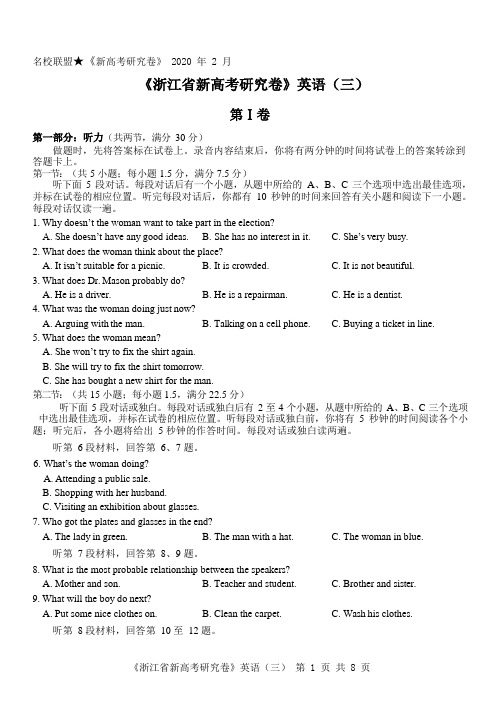
名校联盟★《新高考研究卷》 2020 年 2 月《浙江省新高考研究卷》英语(三)第Ⅰ卷第一部分:听力(共两节,满分30 分)做题时,先将答案标在试卷上。
录音内容结束后,你将有两分钟的时间将试卷上的答案转涂到答题卡上。
第一节:(共5 小题;每小题1.5 分,满分7.5 分)听下面5 段对话。
每段对话后有一个小题,从题中所给的A、B、C 三个选项中选出最佳选项,并标在试卷的相应位置。
听完每段对话后,你都有10 秒钟的时间来回答有关小题和阅读下一小题。
每段对话仅读一遍。
1.Why doesn’t the woman want to take part in the election?A. She doesn’t have any good ideas.B. She has no interest in it.C. She’s very busy.2.What does the woman think about the place?A. It isn’t suitable for a picnic.B. It is crowded.C. It is not beautiful.3.What does Dr. Mason probably do?A. He is a driver.B. He is a repairman.C. He is a dentist.4.What was the woman doing just now?A. Arguing with the man.B. Talking on a cell phone.C. Buying a ticket in line.5.What does the woman mean?A.She won’t try to fix the shirt again.B.She will try to fix the shirt tomorrow.C.She has bought a new shirt for the man.第二节:(共15 小题;每小题1.5,满分22.5 分)听下面5 段对话或独白。
浙江省2020届高三2月新高考研究卷英语卷(2) Word版含解析

名校联盟★《新高考研究卷》 2020 年 2 月《浙江省新高考研究卷》英语(二)第Ⅰ卷第一部分:听力(共两节,满分30 分)做题时,先将答案标在试卷上。
录音内容结束后,你将有两分钟的时间将试卷上的答案转涂到答题卡上。
第一节:(共5 小题;每小题1.5 分,满分7.5 分)听下面5 段对话。
每段对话后有一个小题,从题中所给的A、B、C 三个选项中选出最佳选项,并标在试卷的相应位置。
听完每段对话后,你都有10 秒钟的时间来回答有关小题和阅读下一小题。
每段对话仅读一遍。
1.Wha t’s the woman most probably?A. A teacher.B. A reporter.C. A librarian.2.Where should the man take the first turning?A. At the theater.B. At a post office.C. At the barber’s shop.3.Why have Tina’s parents moved to London?A. To work there.B. To stay with Tina.C. To run a new school.4.What are the speakers talking about?A. An artist.B. A dish.C. A trip.5.How much should the man pay in total?A. $ 11.B. $ 9.C. $ 7.第二节:(共15 小题;每小题1.5,满分22.5 分)听下面5 段对话或独白。
每段对话或独白后有几个小题,从题中所给的A、B、C 三个选项中选出最佳选项,并标在试卷的相应位置。
听每段对话或独白前,你将有时间阅读各个小题,每小题5 秒钟,听完后,各小题将给出 5 秒钟的作答时间。
每段对话或独白读两遍。
听第 6 段材料,回答第6~7 题。
详解版:2020年2月浙江省新高考研究卷英语(2)
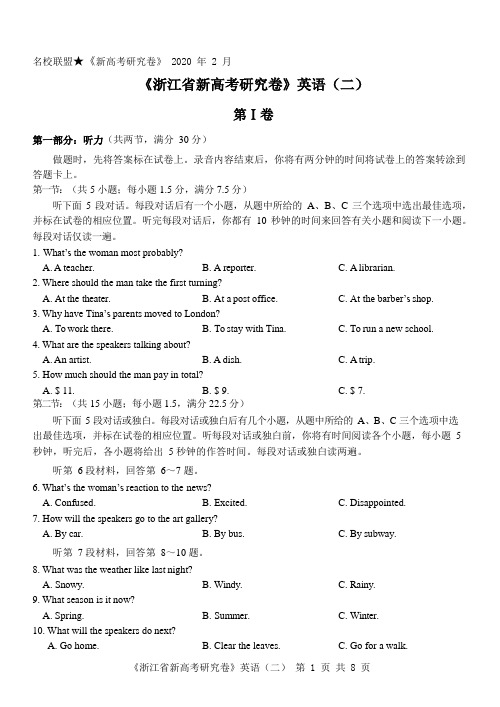
名校联盟★《新高考研究卷》 2020 年 2 月《浙江省新高考研究卷》英语(二)第Ⅰ卷第一部分:听力(共两节,满分30 分)做题时,先将答案标在试卷上。
录音内容结束后,你将有两分钟的时间将试卷上的答案转涂到答题卡上。
第一节:(共5 小题;每小题1.5 分,满分7.5 分)听下面5 段对话。
每段对话后有一个小题,从题中所给的A、B、C 三个选项中选出最佳选项,并标在试卷的相应位置。
听完每段对话后,你都有10 秒钟的时间来回答有关小题和阅读下一小题。
每段对话仅读一遍。
1.What’s the woman most probably?A. A teacher.B. A reporter.C. A librarian.2.Where should the man take the first turning?A. At the theater.B. At a post office.C. At the barber’s shop.3.Why have Tina’s parents moved to London?A. To work there.B. To stay with Tina.C. To run a new school.4.What are the speakers talking about?A. An artist.B. A dish.C. A trip.5.How much should the man pay in total?A. $ 11.B. $ 9.C. $ 7.第二节:(共15 小题;每小题1.5,满分22.5 分)听下面5 段对话或独白。
每段对话或独白后有几个小题,从题中所给的A、B、C 三个选项中选出最佳选项,并标在试卷的相应位置。
听每段对话或独白前,你将有时间阅读各个小题,每小题5 秒钟,听完后,各小题将给出 5 秒钟的作答时间。
每段对话或独白读两遍。
听第 6 段材料,回答第6~7 题。
浙江省2020届高三2月新高考研究卷英语卷(5) Word版含解析
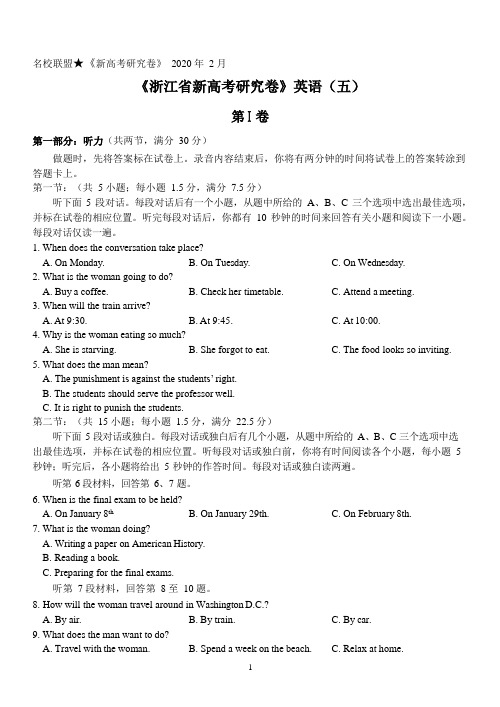
名校联盟★《新高考研究卷》2020 年 2 月《浙江省新高考研究卷》英语(五)第Ⅰ卷第一部分:听力(共两节,满分30 分)做题时,先将答案标在试卷上。
录音内容结束后,你将有两分钟的时间将试卷上的答案转涂到答题卡上。
第一节:(共 5 小题;每小题 1.5 分,满分7.5 分)听下面5 段对话。
每段对话后有一个小题,从题中所给的A、B、C 三个选项中选出最佳选项,并标在试卷的相应位置。
听完每段对话后,你都有10 秒钟的时间来回答有关小题和阅读下一小题。
每段对话仅读一遍。
1.When does the conversation take place?A. On Monday.B. On Tuesday.C. On Wednesday.2.What is the woman going to do?A. Buy a coffee.B. Check her timetable.C. Attend a meeting.3.When will the train arrive?A. At 9:30.B. At 9:45.C. At 10:00.4.Why is the woman eating so much?A. She is starving.B. She forgot to eat.C. The food looks so inviting.5.What does the man mean?A.The punishment is against the students’ right.B.The students should serve the professor well.C.It is right to punish the students.第二节:(共15 小题;每小题1.5 分,满分22.5 分)听下面5 段对话或独白。
每段对话或独白后有几个小题,从题中所给的A、B、C 三个选项中选出最佳选项,并标在试卷的相应位置。
2020年2月版浙江省新高考研究卷英语(一)

名校联盟★《新高考研究卷》2020年02月《浙江省新高考研究卷》英语(一)第Ⅰ卷第一部分:听力(共两节,满分30分)做题时,先将答案标在试卷上。
录音内容结束后,你将有两分钟的时间将试卷上的答案转涂到答题卡上。
第一节:(共5小题;每小题1.5分,满分7.5分)听下面5段对话。
每段对话后有一个小题,从题中所给的A、B、C三个选项中选出最佳选项,并标在试卷的相应位置。
听完每段对话后,你都有10秒钟的时间来回答有关小题和阅读下一小题。
每段对话仅读一遍。
1. What does the woman mean?A. Peter likes to follow the fashion.B. Peter has a bad taste in dressing.C. Peter missed a few lessons.2. What is the probable relationship between the speakers?A. Mother and son.B. Doctor and patient.C. Teacher and student.3. What does the man want to know?A. Susan’s plan for tonight.B. The address of the Duce’s.C. A reservation phone number.4. How does the woman feel now?A. Nervous.B. Excited.C. Relaxed.5. How does the woman deal with difficult lectures?A. By recording them.B. By talking with lecturers.C. By attending them again. 第二节:(共15小题;每小题1.5,满分22.5分)听下面5段对话或独白。
详解版:2020年2月浙江省新高考研究卷英语(1)

名校联盟★《新高考研究卷》2020 年02 月《浙江省新高考研究卷》英语(一)第Ⅰ卷第一部分:听力(共两节,满分30 分)做题时,先将答案标在试卷上。
录音内容结束后,你将有两分钟的时间将试卷上的答案转涂到答题卡上。
第一节:(共5 小题;每小题1.5 分,满分7.5 分)听下面5 段对话。
每段对话后有一个小题,从题中所给的A、B、C 三个选项中选出最佳选项,并标在试卷的相应位置。
听完每段对话后,你都有10 秒钟的时间来回答有关小题和阅读下一小题。
每段对话仅读一遍。
1.What does the woman mean?A.Peter likes to follow the fashion.B.Peter has a bad taste in dressing.C.Peter missed a few lessons.2.What is the probable relationship between the speakers?A. Mother and son.B. Doctor and patient.C. Teacher and student.3.What does the man want to know?A.Susan’s plan for tonight.B.The address of the Duce’s.C.A reservation phone number.4.How does the woman feel now?A. Nervous.B. Excited.C. Relaxed.5.How does the woman deal with difficult lectures?A. By recording them.B. By talking with lecturers.C. By attending them again. 第二节:(共15 小题;每小题1.5,满分22.5 分)听下面5 段对话或独白。
浙江省2020届高三2月新高考研究卷英语卷(3) Word版含解析

名校联盟★ 2020 年 2 月《浙江省新高考研究卷》英语(三)第Ⅰ卷第一部分:听力(共两节,满分30 分)做题时,先将答案标在试卷上。
录音内容结束后,你将有两分钟的时间将试卷上的答案转涂到答题卡上。
第一节:(共5 小题;每小题1.5 分,满分7.5 分)听下面5 段对话。
每段对话后有一个小题,从题中所给的A、B、C 三个选项中选出最佳选项,并标在试卷的相应位置。
听完每段对话后,你都有10 秒钟的时间来回答有关小题和阅读下一小题。
每段对话仅读一遍。
1.Why d oesn’t the woman want to take part in the election?A. She doesn’t have any good ideas.B. She has no interest in it.C. She’s very busy.2.What does the woman think about the place?A. It isn’t suitable for a picnic.B. It is crowded.C. It is not beautiful.3.What does Dr. Mason probably do?A. He is a driver.B. He is a repairman.C. He is a dentist.4.What was the woman doing just now?A. Arguing with the man.B. Talking on a cell phone.C. Buying a ticket in line.5.What does the woman mean?A.She won’t try to fix the shirt again.B.She will try to fix the shirt tomorrow.C.She has bought a new shirt for the man.第二节:(共15 小题;每小题1.5,满分22.5 分)听下面5 段对话或独白。
浙江省宁波市2020-2021学年度新高考高三第二学期英语模拟试题(三)(含答案)

2020-2021学年度新高考高三第二学期英语模拟试题(三)第Ⅰ卷第一部分:听力(共两节,满分30分)做题时,先将答案标在试卷上。
录音内容结束后,你将有两分钟的时间将试卷上的答案转涂到答题卡上。
第一节:(共5小题;每小题1.5分,满分7.5分)听下面5段对话。
每段对话后有一个小题,从题中所给的A、B、C三个选项中选出最佳选项,并标在试卷的相应位置。
听完每段对话后,你都有10秒钟的时间来回答有关小题和阅读下一小题。
每段对话仅读一遍。
1. What is the cat's main color?A. Gray.B.White.C. Black.2. What is the woman doing?A. Filling in a form.B.Applying for a job.C. Connecting to the Internet.3. Where does the conversation probably take place?A. At a classroom.B.At a library.C. At a bookstore.4. What time is it now?A. It’s 3:00 p. m.B.It’s4:30p.m.C. It’s 6:00 p. m.5. What does the man think of those students?A. He feels sorry for them.B. He believes it's right to punish them.C. He thinks those students should serve others.第二节:(共15小题;每小题1.5分,满分22.5分)听下面5段对话或独白。
每段对话或独白后有几个小题,从题中所给的A、B、C三个选项中选出最佳选项,并标在试卷的相应位置。
听每段对话或独白前,你将有时间阅读各个小题,每小题5秒钟;听完后,各小题将给出5秒钟的作答时间。
2020届浙江省高三2月新高考研究卷英语卷(2)含解析 听力

名校联盟★《新高考研究卷》 2020 年 2 月《浙江省新高考研究卷》英语(二)第Ⅰ卷第一部分:听力(共两节,满分30 分)做题时,先将答案标在试卷上。
录音内容结束后,你将有两分钟的时间将试卷上的答案转涂到答题卡上。
第一节:(共5 小题;每小题1.5 分,满分7.5 分)听下面5 段对话。
每段对话后有一个小题,从题中所给的A、B、C 三个选项中选出最佳选项,并标在试卷的相应位置。
听完每段对话后,你都有10 秒钟的时间来回答有关小题和阅读下一小题。
每段对话仅读一遍。
1.Wha t’s the woman most probably?A. A teacher.B. A reporter.C. A librarian.2.Where should the man take the first turning?A. At the theater.B. At a post office.C. At the barber’s shop.3.Why have Tina’s parents moved to London?A. To work there.B. To stay with Tina.C. To run a new school.4.What are the speakers talking about?A. An artist.B. A dish.C. A trip.5.How much should the man pay in total?A. $ 11.B. $ 9.C. $ 7.第二节:(共15 小题;每小题1.5,满分22.5 分)听下面5 段对话或独白。
每段对话或独白后有几个小题,从题中所给的A、B、C 三个选项中选出最佳选项,并标在试卷的相应位置。
听每段对话或独白前,你将有时间阅读各个小题,每小题5秒钟,听完后,各小题将给出 5 秒钟的作答时间。
每段对话或独白读两遍。
听第6 段材料,回答第6~7 题。
2020届浙江省普通高等学校招生全国统一考试(调研)英语

2020年普通高等学校招生全国统一考试(调研)英语试题卷选择题部分第一部分听力(共两节,满分30分)做题时,先将答案标在试卷上。
录音内容结束后,你将有两分钟的时间将试卷上的答案转涂到答题卡上。
例:How much is the shirt?A. £19.15.B. £9.18.C. £9.15.答案是C。
第一节(共5小题;每小题1.5分,满分7.5分)听下面5段对话。
每段对话后有一个小题,从题中所给的A、B、C三个选项中选出最佳选项,并标在试卷的相应位置。
听完每段对话后,你都有10秒钟的时间来回答有关小题和阅读下一小题。
每段对话仅读一遍。
1. What are the speakers talking about?A. The radioB. The weather.C. The weekend.2. What is the woman going to do?A . See her aunt. B. Go shopping. C. Deliver milk.3. Where are the speakers?A. On the road.B. In the hospital.C. At the man’s home.4. Why does Lucy refuse the man’s offer?A. She is very busy.B. She is poorly paid.C. She is unconfident.5. What will Bob probably do next time?A. Avoid skating again.B. Warm up in advance.C. Take a training course.第二节(共15小题;每小题1.5分,满分22.5分)听下面5段对话或独白。
每段对话或独白后有几个小题,从题中所给的A、B、C三个选项中选出最佳选项,并标在试卷的相应位置。
浙江省新高考研究卷 (3)

名校联盟★《新高考研究卷》2020年02月《浙江省新高考研究卷》英语(三)第1卷第一部分听力(共两节,满分30分)第一节(共5小题;每小题1.5分,满分7.5分)听下面5段对话。
每段对话后有一个小题,从题中所给的A、B、C三个选项中选出最佳选项,并标在试卷的相应位置,听完每段对话后,你都有10秒钟的时间来回答有关小题和阅读下一小题。
每段对话仅读一遍。
1. Why doesn’t the woman want to take part in the election?A. She doesn’t have any good ideas.B. She has no interest in it.C. She’s very busy.2. What does the woman think about the place?A. It isn’t suitable for a picnic.B. It is crowded.C. It is not beautiful.3. What does Dr. Mason probably do?A. He is a driver.B. He is a repairman.C. He is a dentist.4. What was the woman doing just now?A. Arguing with the man.B. Talking on a cell phone.C. Buying a ticket in line.5. What does the woman mean?A. She won't try to fix the shirt again.B. She will try to fix the shirt tomorrow.C. She has bought a new shirt for the man.第二节(共15小题;每小题1.5分,满分22.5分)听下面5段对话或独白。
《浙江省新高考研究卷》英语参考答案
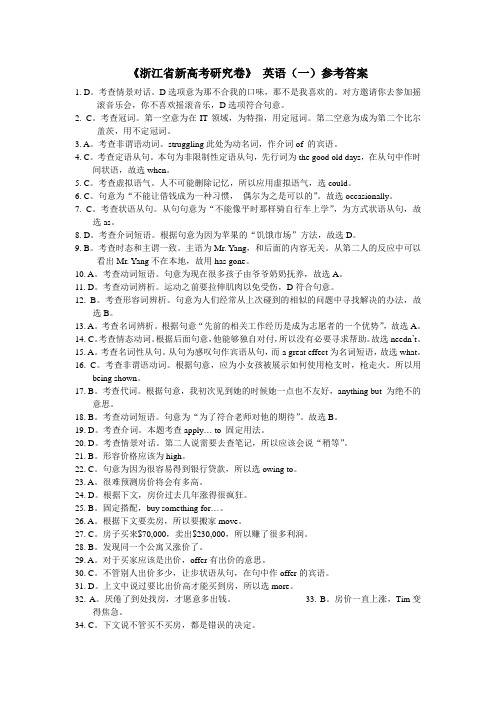
《浙江省新高考研究卷》英语(一)参考答案1. D。
考查情景对话。
D选项意为那不合我的口味,那不是我喜欢的。
对方邀请你去参加摇滚音乐会,你不喜欢摇滚音乐,D选项符合句意。
2. C。
考查冠词。
第一空意为在IT领域,为特指,用定冠词。
第二空意为成为第二个比尔盖茨,用不定冠词。
3. A。
考查非谓语动词。
struggling此处为动名词,作介词of 的宾语。
4. C。
考查定语从句。
本句为非限制性定语从句,先行词为the good old days,在从句中作时间状语,故选when。
5. C。
考查虚拟语气。
人不可能删除记忆,所以应用虚拟语气,选could。
6. C。
句意为“不能让借钱成为一种习惯,偶尔为之是可以的”。
故选occasionally。
7. C。
考查状语从句。
从句句意为“不能像平时那样骑自行车上学”,为方式状语从句,故选as。
8. D。
考查介词短语。
根据句意为因为苹果的“饥饿市场”方法,故选D。
9. B。
考查时态和主谓一致。
主语为Mr. Yang,和后面的内容无关。
从第二人的反应中可以看出Mr. Yang不在本地,故用has gone。
10. A。
考查动词短语。
句意为现在很多孩子由爷爷奶奶抚养,故选A。
11. D。
考查动词辨析。
运动之前要拉伸肌肉以免受伤,D符合句意。
12. B。
考查形容词辨析。
句意为人们经常从上次碰到的相似的问题中寻找解决的办法,故选B。
13. A。
考查名词辨析。
根据句意“先前的相关工作经历是成为志愿者的一个优势”,故选A。
14. C。
考查情态动词。
根据后面句意,他能够独自对付,所以没有必要寻求帮助。
故选needn’t。
15. A。
考查名词性从句。
从句为感叹句作宾语从句,而a great effect为名词短语,故选what。
16. C。
考查非谓语动词。
根据句意,应为小女孩被展示如何使用枪支时,枪走火。
所以用being shown。
17. B。
考查代词。
根据句意,我初次见到她的时候她一点也不友好,anything but 为绝不的意思。
浙江省名校新高考研究联盟
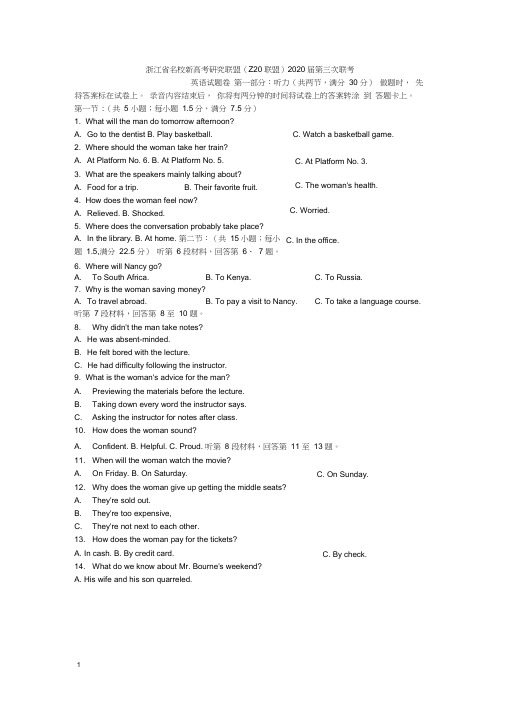
浙江省名校新高考研究联盟(Z20联盟)2020届第三次联考英语试题卷 第一部分:听力(共两节,满分 30 分) 做题时, 先将答案标在试卷上。
录音内容结束后, 你将有两分钟的时间将试卷上的答案转涂 到 答题卡上。
第一节 :(共 5 小题;每小题 1.5分,满分 7.5 分) 1. What will the man do tomorrow afternoon? A. Go to the dentist B. Play basketball. C. Watch a basketball game.2. Where should the woman take her train? A. At Platform No. 6. B. At Platform No. 5.3. What are the speakers mainly talking about? A. Food for a trip. B. Their favorite fruit.4. How does the woman feel now?A. Relieved.B. Shocked.5. Where does the conversation probably take place?A. In the library.B. At home. 第二节:(共 15小题;每小题 1.5,满分 22.5 分) 听第 6 段材料,回答第 6、 7 题。
6. Where will Nancy go? A. To South Africa. B. To Kenya.C. To Russia.7. Why is the woman saving money? A. To travel abroad. B. To pay a visit to Nancy. C. To take a language course.听第 7 段材料,回答第 8 至 10 题。
- 1、下载文档前请自行甄别文档内容的完整性,平台不提供额外的编辑、内容补充、找答案等附加服务。
- 2、"仅部分预览"的文档,不可在线预览部分如存在完整性等问题,可反馈申请退款(可完整预览的文档不适用该条件!)。
- 3、如文档侵犯您的权益,请联系客服反馈,我们会尽快为您处理(人工客服工作时间:9:00-18:30)。
名校联盟★《新高考研究卷》 2020年2月《浙江省新高考研究卷》英语(三)第Ⅰ卷第一部分:听力(共两节,满分30分)做题时,先将答案标在试卷上。
录音内容结束后,你将有两分钟的时间将试卷上的答案转涂到答题卡上。
第一节:(共5小题;每小题1.5分,满分7.5分)听下面5段对话。
每段对话后有一个小题,从题中所给的A、B、C三个选项中选出最佳选项,并标在试卷的相应位置。
听完每段对话后,你都有10秒钟的时间来回答有关小题和阅读下一小题。
每段对话仅读一遍。
1. Why doesn’t the woman want to take part in the election?A. She doesn’t have any good ideas.B. She has no interest in it.C. She’s very busy.2. What does the woman think about the place?A. It isn’t suitable for a picnic.B. It is crowded.C. It is not beautiful.3. What does Dr. Mason probably do?A. He is a driver.B. He is a repairman.C. He is a dentist.4. What was the woman doing just now?A. Arguing with the man.B. Talking on a cell phone.C. Buying a ticket in line.5. What does the woman mean?A. She won’t try t o fix the shirt again.B. She will try to fix the shirt tomorrow.C. She has bought a new shirt for the man.第二节:(共15小题;每小题1.5,满分22.5分)听下面5段对话或独白。
每段对话或独白后有2至4个小题,从题中所给的A、B、C三个选项中选出最佳选项,并标在试卷的相应位置。
听每段对话或独白前,你将有5秒钟的时间阅读各个小题;听完后,各小题将给出5秒钟的作答时间。
每段对话或独白读两遍。
听第6段材料,回答第6、7题。
6.What’s the woman doing?A. Attending a public sale.B. Shopping with her husband.C. Visiting an exhibition about glasses.7. Who got the plates and glasses in the end?A. The lady in green.B. The man with a hat.C. The woman in blue.听第7段材料,回答第8、9题。
8. What is the most probable relationship between the speakers?A. Mother and son.B. Teacher and student.C. Brother and sister.9. What will the boy do next?A. Put some nice clothes on.B. Clean the carpet.C. Wash his clothes.听第8段材料,回答第10至12题。
10. What do we know about Jimmy?A. He was sick this morning.B. He quit his job earlier this month.C. He has been delivering newspapers since last year.11. What did the man forget to do?A. Put the payment in the mailbox.B. Sign the check for his payment.C. Put a stamp on the envelope with his payment.12. How might the speakers pay for their paper in the future?A. Paying online.B. Paying in cash.C. Paying by cheque.听第9段材料,回答第13至16题。
13. What is the woman doing?A. Having a job interview.B. Attending a talk show.C. Trying to find a boyfriend.14. Where does the woman live?A. In an apartment alone.B. In the countryside with her parents.C. At the kindergarten where she works.15. How is the woman’s present life?A. She goes dating a lot.B. Her work takes much of her time.C. She has to look after her parents every day.16. What quality matters most to the woman?A. Kindness.B. Honesty.C. Good looks.听第10段材料,回答第17至20题。
17. What problem do people often have according to the speaker?A. They waste a lot of time.B. They’re too busy to enjoy life.C. They don’t want to take exercise.18. What sport did Travis like best in the past?A. Walking.B. Running.C. Swimming.19. What does the speaker suggest doing in preparation?A. Getting up earlier.B. Taking a quick shower.C. Having a good breakfast.20. Why does the speaker give the talk?A. To sell walking shoes.B. To suggest saving time.C. To tell a healthy lifestyle.第二部分:阅读理解(共两节,满分35分)第一节:(共10个小题;每小题2.5分,满分25分)阅读下列短文,从每题所给的A、B、C和D四个选项中,选出最佳选项,并在答题卡上将该项涂黑。
AYou arrive at the mall anxious to buy your favorite CD or the coolest video game. Nothing will stop you, not even the price—even if you don’t have enough money, Mom or Dad will take out a credit card to pay. But wait! Is using a credit card really that simple?Using a credit card is a way of borrowing money to buy things. Credit card companies lend you money, which you are expected to pay back. They don’t lend y ou money just to be nice, however. In fact, they make billions of dollars from those loans.Let’s say you want a CD and a new pair of jeans, but you don’t have the $45 they cost. So instead, you charge them on a credit card. About a month later, the credit card company sends you a bill for $45 for the things you bought. If you pay the whole $45 right away, then using the credit card didn’t cost you anything. But what if you can’t pay the whole bill? Let’s say you pay $10 the first month. Now the credit car d company begins to earn money from you. They charge extra money, called interest, on whatever part of the money you didn’t pay. Now the $35 you still owe on your bill begins to grow. Even if you don’t charge anything more on the credit card, by the time you get your bill the following month, you will owe more than $35. And every day, interest keeps adding up. So if you continue to pay just a small amount of the money you owe each month, those jeans and CD will end up costing you more than the $45 you thought you paid when you bought them.Some people get themselves in trouble with credit cards by charging more than they can afford to pay back. Knowing how to use credit wisely will help you to be a smart “charger” as well as a smart shopper.21. What’s the purpose of writing paragraph 1?A. To draw readers’ attention to the popularity of credit cards.B. To explain the reasons for the frequent use of credit cards.C. To appeal to more people to use credit cards constantly.D. To warn readers of the hidden danger of using credit cards.22. What’s paragraph 3 mainly about?A. What items people can buy with a credit card.B. What will happen if people can’t pay back the money.C. How a credit card company make profits from its users.D. How people pay back the money after using credit cards.23. Which view does the author want to convey?A. Remember to pay the whole bill the first month.B. Only charge what you can afford when using credit.C. Use credit cards less often or you’ll get into trouble.D. Be a smart shopper and never borrow money to buy things.BVillavicencio, a shabby city of half a million people, considers itself the city of half a gateway to los llanos, Colombia’s eastern plains. Now and for the next few months few people will be passing throu gh it. Mudslides(泥石流)since May have blocked the main highway, the Vía al Llano, which connects the city to Bogotá, Colombia’s capital. More rocks and mud threaten workers trying to unblock the road, along which two-thirds of domestically produced goods are transported. Colombia’s government says this could take up to three months.Residents of Villavicencio and the surrounding plains are beginning to feel the consequences. Potatoes, garlic and eggs have become scarce in grocery stores. Shoppers hunt through produce bins to find the few tomatoes and carrots that have not rotted. More than 90% of hotel reservations in the plains region have been cancelled.Colombia is a road-builder’s nightmare. The Andes(安第斯山脉)separate into three ranges at the southern border. The mountains can climb to 4,000 metres from sea level in less than 100km. Colombia gets more rain than any other country in the world, which makes it harder to keep the road in good condition. Short of cash, the government has given private firms special rights to build roads. Vía al Llano, among the earliest projects built in this way, are likely to cause accidents.To relieve los llanos’s isolation(隔离), Satena, a state-owned airline, and EasyFly have announced more flights between Bogotá and Villavicencio. The government has currently stopped passenger fees on flights between the cities. Goods can get through on two smaller alternative roads and money paid to use the two roads will be halved. But w hat the plains need most is a road that can cope with Colombia’s dangerous, rain-soaked topography(地形). That goes for much of the rest of the country.24. We can learn from the text that the highway the Vía al Llano .A. is considered half a gateway to los llanosB. connects los llanos and Colombia’s capitalC. has been blocked by Mudslides since MayD. won’t be unblocked by workers until May25. What does the underlined word “scarce” probably mean?A. Available.B. Inadequate.C. Organic.D. Affordable.26. Why is Colombia said to be a road-builder’s nightmare?A. It’s surrounded by mountains of different height in the south.B. The continuous rain makes the construction of roads difficult.C. The government lacks money to build and repair roads.D. Car accidents are more likely to take place in Colombia.27. According to the author, what’s the best solution to los llanos’s isolation?A. Providing more flights between Bogotá and Villavicencio.B. Cancelling passenger fees on flights between the cities.C. Charging less money for using the two alternative roads.D. Constructing a proper road that can survive the situation.CIt’s early in the morning and I’ve hardly caught any shuteye. My breakfast of scrambled eggs and strong coffee will keep me alert(警觉的)before lunch. After lunch, I’ll brace myself for an afternoon of yawning and feeling bad-tempered in the office. But I’m not alone. We all seem to be yawning more often. Are we turning into a generation of insomniacs(失眠症患者)? How is modern life affecting our sleep patterns?We can start by blaming the light bulb and other forms of artificial illumination. Experts say that on average people go to bed and wake up two hours later than the previous generation. Then, there are the computers. Research led by Professor Charles Czeisler of Harvard Medical School has shown that people who read electronic books before going to bed take longer to nod off. They have lower levels of melatonin —the hormone that regulates our body’s internal clock. And they’re less ale rt in the morning.Professor Czeisler said, “In the past 50 years, there’s been a decline in average sleep duration and quality. Since more people are choosing electronic devices for reading, communication and entertainment, particularly children and adolescents who already experience significant sleep loss, research evaluating the long-term consequences of these devices on health and safety is urgently needed.”So the first thing to do if you want to have a restful night is to leave computers out of the bedroom. Avoid alcohol, as it might reduce our cycles of REM sleep —this is the “rapid eye movement” sleep, when our brains process the information we received during the day. It disrupts(紊乱)your brain activity. And don’t eat nuts, bacon and cheese in the e vening. They contain a substance which causes the release of a brain stimulant(刺激物).After that, if you still can’t sleep, start counting sheep. Maybe that’s the best technique to avoid another afternoon of yawning in the office.28. What can we learn fro m Professor Czeisler’s research?A. The light bulb is to blame for people’s poor sleeping habits.B. Those falling asleep late usually have lower levels of melatonin.C. Children suffer from sleep loss mainly due to electronic devices.D. It’s been proved that electronic devices have lasting impacts on health.29. What does the underlined word “It” in paragraph 4 refer to?A. The intake of alcohol.B. The frequent use of the computer.C. The decline in the cycle of REM sleep.D. The information processed in the brain.30. What might be the best title of this text?A. Sleeplessness in the 21st CenturyB. Rapid Eye Movement SleepC. Research into Electronic DevicesD. Techniques to Avoid Yawning第二节:(共5个小题;每小题2分,满分10分)根据短文内容,从短文后的选项中选出能填入空白处的最佳选项。
